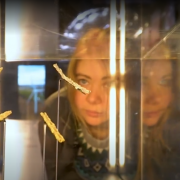Design for a sustainable future
Sustainable development is the greatest challenge of our times. As Camille Pisani pointed out in reflecting on our commitments during the Ecsite Online Conference, "mitigating the impact of climate change needs not only changes in individual and collective behaviour, it needs also technical innovations, a better production, design and processes using less energy and materials." From how we use the resources, to how we minimise waste and upcycle, science centres and fab-labs are exploring ways to create a more sustainable future. Could this be an opportunity for us all to not only communicate about climate change and potential solutions to create change, but also be a way to rethink how we make exhibitions and how we distil these changes into the community? Seeing the eco-angle as integral, are we able to design for longevity and circularity? How can we support internal teams to put in practice this thinking and help them ask the right questions to find adequate solutions?
This session is part of the Biodiversity and climate crisis conference track.
Facilitator
Project Manager in Sustainability
Session speakers
Baptiste Bureau, designer, has used the eco-design approach to design two projects (Les Etincelles - Palais de la découverte) and the lab de la Cité des bébés.
Sarah will share experiences on eco-design from exhibitions at SPARKOH! including : tips on building reusable exhibit furniture, upcyling stuff from other museums and exhibiting rubbish.
Future Learning Action Research
Xavier, as future learning researcher, will showcase Fab Lab Barcelona educational projects in which co-design, digital fabrication and creative craft practices facilitate the transition towards the circulity of diverse people and communities.
Children, youth and adults in formal and non-formal educational environments experience circularity not only by creating materials with olive and avocado pits, coffee skins, vegetables and fruits or restaurant scraps, but also by exploring collaboration, inclusivity, self-management towards shared knowledge with local actors.
Gunnar will present a few selected projects that can function as role models: including an exhibition that right from the start was intended for upcycling and later transformed into a co-creation project for children in need. There will also be examples of exhibitions which were entirely built of Re-Board so that both production and logistics were particularly sustainable. Gunnar is convinced that our industry has to become much more sustainable!




